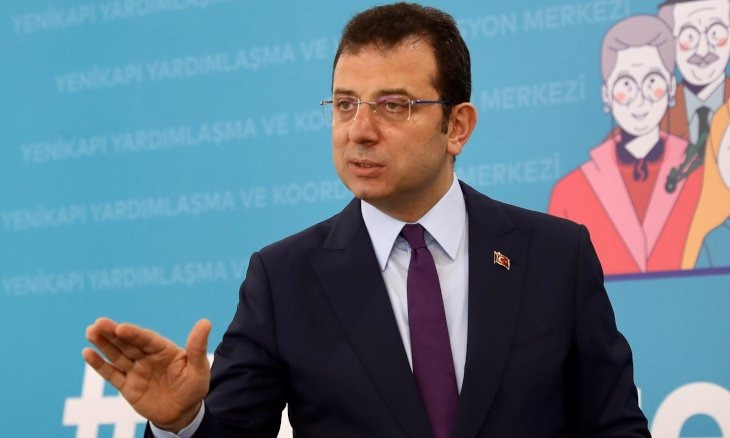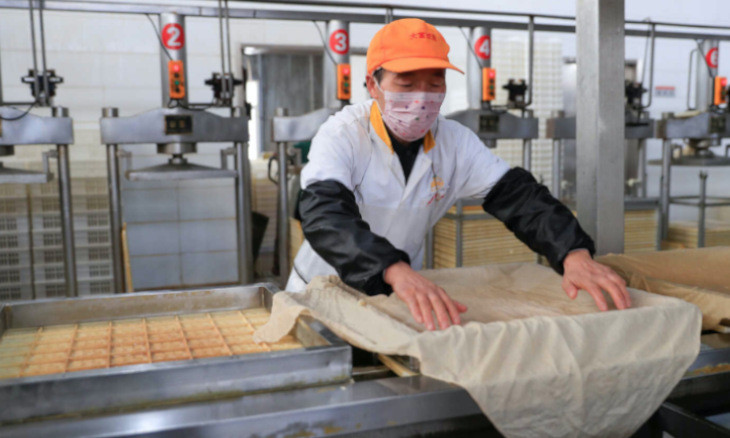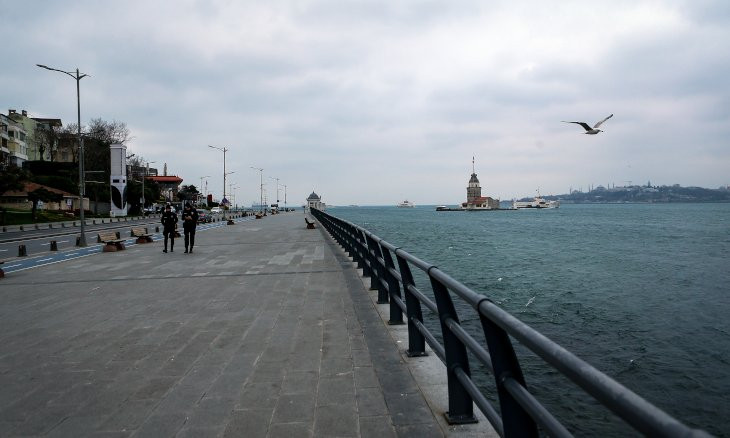DUVAR EXCLUSIVE - 11 days with COVID-19
Duvar reporter Aynur Tekin spent 11 days in hospital with COVID-19 symptoms. In this piece, she takes the reader through the different stages of her illness and the treatment she received at hospital. She also offers a few suggestions on how to talk to a COVID-19 patient.
Aynur Tekin / DUVAR
COVID-19 is a manic-depressive virus. It comes unannounced and leaves abruptly. At least that’s what happened in my case. My condition suddenly deteriorated to the point where I had to be hospitalized. I lay in a hospital bed for four days with no sign of improvement. On the fifth day, I woke up feeling as if the past four days had never happened. My symptoms improved and my energy surged back.
I’ve always had allergies when the seasons change causing me to cough. My usual allergies began in mid-February this year. I did everything I could to recover before I embarked upon a short trip to Paris I had scheduled for the end of February. The allergies did not abate, so I brought my allergies to Paris with me. Despite them, I was able to do some sightseeing during the last few days of my trip.
Back then, there was already a slight discomfort over coronavirus in Paris, but the metro, squares and cafes were still packed. When I entered the terminal at Orly Airport, there were no thermal cameras around. Instead, toddlers crawled on the ground and adults sat next to each other with no distance whatsoever.
“I wonder if we’re making too big a deal about the coronavirus,” I thought to myself that minute. I would realize how wrong I was in the days that followed.
I returned to Istanbul on the night of March 7. At that stage, coronavirus was only just appearing on Turkey’s public agenda and the precautions were just being announced. The Health Minister Fahrettin Koca told anyone returning from a trip abroad to stay home for two weeks on March 5, though it was mere advice. Public employees weren’t even given days off.
 Turkish teachers blacklisted for not contributing to Erdoğan's donation campaign, independent union claims
Turkish teachers blacklisted for not contributing to Erdoğan's donation campaign, independent union claimsI was generally in good health and my allergies weren’t so bothersome. Yet the following day, I woke up feeling tired and with muscle aches. I took the metro and the ferry twice that day, as well as the following day. That’s my biggest regret about the whole process. I stayed home afterwards, but that was to protect myself from the virus, not others, since I didn’t think my condition anything to do with it.
I thought I had a dry cough from allergies and that I was tired from traveling. Perhaps that was actually the case for the first five days. I continued to take my allergy medication.
On the night of March 13, I started feeling extreme fatigue. I had coughing fits triggered whilst trying to breathe. Unlike any other day, I had a fever of about 38.5 celsius. The next day, I immediately went to the hospital. The physician examined my lungs and checked by body temperature. They said I had an infection and prescribed me with some antibiotics. They said my coughing was caused by allergies and they didn’t think I needed a chest x-ray.
The medication brought my fever down but my dry cough and muscle aches remained. I realized that my allergies wouldn’t be manifesting so direly and decided that I needed to see an expert on respiratory infections.
Day 1
On March 17, I went to the Süreyyapaşa Pulmonology Teaching and Research Hospital. Usually, it would have been near impossible to get an appointment, but due to the coronavirus outbreak, some cancellations were made and I was able to see someone.
I was taken straight away to the x-ray room. The radiologist said that my x-rays pointed to viral pneumonia, meaning I was suspected to have COVID-19, and immediately put me in touch with the infectious disease department. They sent me to wait in the empty lobby and told me to keep my mask on. After the examination, they proceeded to clean and air the room I had visited.
After an hour of waiting in the lobby, I received a call from the radiologist. They told me that I had to be admitted to the hospital and that I needed to go to the sixth floor without using the elevator. It was hard to climb six floors as I struggled to breathe. Still, I was glad to see that hospitals were taking precautions.
 Istanbul Mayor reiterates call for city-wide curfew amid increasing number of coronavirus cases
Istanbul Mayor reiterates call for city-wide curfew amid increasing number of coronavirus casesI was admitted to a single room on the hospital’s sixth floor, which was their designated quarantine zone. About an hour after my admission, I received a visited from three physicians.
“This illness is cured with resistance, not medication. So you’re not allowed to be upset,” said Doctor Selahattin, who happened to be the leader of the group. His attitude cheered me up.
A few hours after their visit, another physician came to my room for a COVID-19 test. First they asked about my symptoms and then they swabbed my nose and my throat.
I was up all night with coughing fits.
Day 2
I started a both viral and bacterial treatment whilst waiting for my test results to come in. The doctors gave me antibiotics, an immune system booster and isotonic liquids.
 Turkey’s labor unions urge the gov't to cease all non-essential production immediately
Turkey’s labor unions urge the gov't to cease all non-essential production immediatelyMy dry cough and my muscle aches got worse and wouldn’t let me sleep. I also had a fever, nausea and a headache.
I took two IVs to lower my fever and to get rid of my nausea but neither helped. I would just wash my face with lukewarm water. It was a little scary to see my plum-colored face when I took off my mask to wash my face. I still didn’t feel too concerned or sad. I just didn’t feel anything at all. It seemed like a luxury to get bored, to want to leave the hospital or to get bored. I was busy understanding what it meant to fight for your life.
My habits changed while I was in the hospital, the most important one being a lack of appetite. I didn’t even look at dishes that my healthy self would usually worship. For at least five days, I could get a few bites. I wasn’t thirsty either: I would only drink two glasses of water a day. Any more water made me nauseous. As a result of the fever, the skin on my face started peeling. I couldn’t sleep on my back or stomach because of my aches, so I slept on my side.
Day 3
Breakfast would be delivered at 6.30 every morning. A hospital employee entered my room with a suit on and left the plate of food on a table. Since I took up to four different medications every night, I would force myself to eat at least a bit.
The doctors would come around 11 a.m. They told me they’d give me a new medicine for my cough. That gave me something to look forward to.
The campus of the Süreyyapaşa Hospital is filled with pine trees. Before I went to hospital, I would always see them on my commute to work. From my hospital room, they felt like an old friend. In fact, I could even see the Princes’ Islands from my window. This made for an ideal recovery environment.

Day 4
My first COVID-19 test came back negative. I took a deep breath, but the physicians said they would do another test since they didn’t trust the results.
For the first time since I had gone to the hospital, my nausea was better. I began to take less medication. Later, I received a card from my husband.
 Turkey announces first case of a doctor dying from coronavirus
Turkey announces first case of a doctor dying from coronavirusDay 5
The fifth day was a turning point. I was able to sleep through the night for the first time since I’d had been admitted. Everything felt disproportionately better when I woke up that morning. I wasn’t expecting my condition to improve so fast. I had less aches and my coughing was almost gone.
I was physically better and was able to talk on the phone and look at social media without getting dizzy or nauseous. I called friends and relatives.
 Turkey has shortage of 15,000 critical care nurses, labor representative warns
Turkey has shortage of 15,000 critical care nurses, labor representative warnsThough it is difficult not to get worried amid the constantly rising number of deaths, I would suggest not treating COVID-19 patients like myself as the most unfortunate people on the planet. Instead, I would say it is best to adopt a pragmatic and calm mood. Besides, try avoiding speaking to the patient only about the illness.
Yet is crucial not to feel abandoned during such times. In that regard, I’d personally like to thank the Duvar family for checking up on me during my hospitalization.
Day 6
The healing process continues. My fear of taking deep breaths is slowly vanishing. I can breathe now without coughing – which was unthinkable a little while ago. Hunger, thirst, and normal sleeping patterns are coming back. I even tried relieving the pain in my leg by pacing in my room.
 Izmir Medical Chamber barred from sharing COVID-19 report
Izmir Medical Chamber barred from sharing COVID-19 reportDay 7
Doctors came to carry out a COVID-19 test for the second time. Again, they swabbed my nose and throat. They said it would take at least three days to get the results.
At this point, my life is confined to a 10 square meter room.e I’m not allowed out in the hallways or on the balcony.
Day 8
As I couldn’t eat an egg that was served to me over breakfast, I placed it on my window ledge for the birds.
 Turkey’s social services authority gives seniors 19 tips about COVID-19
Turkey’s social services authority gives seniors 19 tips about COVID-19Day 9
I’m doing okay health-wise. Still waiting for my test results.
I keep on reading. My phone is on silent mode. It’s best to focus on one thing to get your strength back.
Day 10
My second COVID-19 test comes back negative. That tips the odds in favor of viral pneumonia. The doctors tell me they will stop giving me medication, much to my excitement.
“So if my test came back negative and I feel okay, I should be discharged right?” I ask them.
One doctor tells me I will be among the first patients to get discharged, though he says they will have to talk to the infectious disease experts first.
Day 11
The doctors ask me to conduct a new x-ray test. They say that’ll determine whether I can be discharged. I walk to the radiology department on the first floor.
My x-ray says that my lungs are getting better, so I take a last dose of antibiotics. A few hours later, I’m handed my discharge papers upon which I find out that, based on lung x-rays and clinical findings, I was diagnosed with COVID-19 along with viral pneumonia and coughing.
Before releasing me, the doctors told me to stay in isolation for 14 days. They recommended that I sleep in a separate room, separate my personal belongings and wear a mask. I follow all these guidelines.
 Epidemic to linger longer than 1-2 months, says Coronavirus Committee member
Epidemic to linger longer than 1-2 months, says Coronavirus Committee memberI’ve never once had the flu. The last time I had a fever that high was when I was eight. Allergies are my only known condition. Despite this, I found myself in a hospital room with COVID-19. I thought I would be discharged within a couple days. Instead, I spent a total of 11 days in there.
As a last note, I’d like to ponder upon Doctor Selahattin’s words: “This illness is cured with resistance, not medication.” May we have plenty of resistance.
